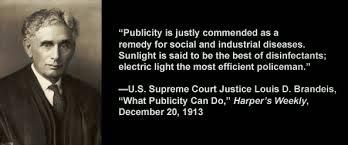
On his Facebook page today, Judge (and Pastor) Wendell Griffen makes a powerful, compelling case for those who know the identity of Michael Brown's killer to disclose this information. As he argues,
There is no moral or other right to kill another person and remain anonymous, at least in a society that says it values human life and public safety. Whenever anyone disturbs public order and safety by taking the life of another person, the public needs and is entitled to name the killer.
Furthermore,
Identifying Michael Brown's killer is a simple yet powerful act of compassion. Michael Brown's parents grieve the death of their son. Public officials should not compound their sorrow by treating their son's death as if it occurred from someone they do not know.
And in conclusion,
Police incident reports are public records. The information being concealed---and let's call this what it is---is public information that the Ferguson, Missouri Police Department and political leadership have a duty to disclose. Their deliberate and high-handed refusal to release the unredacted incident report that contains the name of Michael Brown's killer shows how little they care about public duty, safety, or compassion.
These people are standing with Michael Brown's killer. They aren't protecting the killer. They are helping him hide.
We should not expect or trust these people to render justice concerning Michael Brown.
As the New York Times states in an editorial statement today,
Chief among the transparency issues for protesters has been local authorities' adamant and inexcusable refusal to identify the police officer who shot Mr. Brown, saying the officer faced death threats. Residents have a right to know whether the officer has a record of reckless behavior, and whether the officer lives in the community among the residents being patrolled, or in a very different neighborhood.
As you ponder these statements, have a look at Jaeah Lee's important analysis in Mother Jones this morning of how frequent the shooting of unarmed black men by police, and how frequently their police shooters get off free after they've shot and killed and unarmed black man. And have a look, too, at Matthew Harwood's equally important analysis of the growing militarization of police departments around the U.S., at TomDispatch yesterday.

